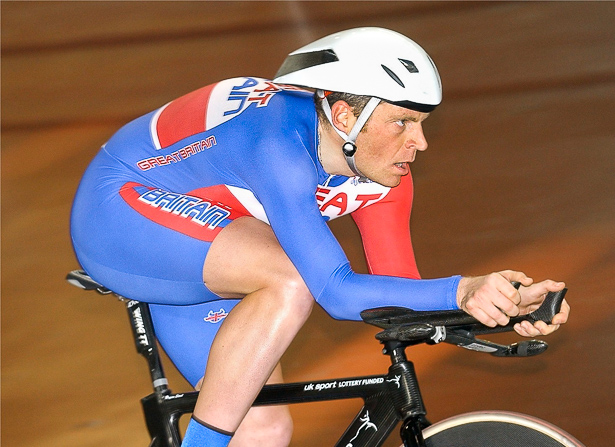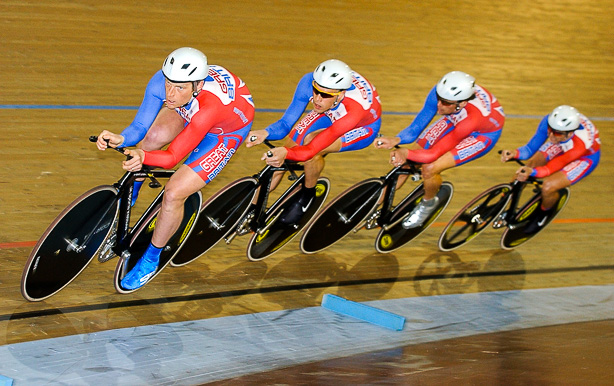We’d expected to be able to hang this interview on another English class team pursuit gold in Glasgow – but not so.
And for the first time since 2009 the GB team failed to make the podium in the track Worlds back in the spring – probably no big deal in the overall scheme of things where The Olympics are what really count to BC, these days.
How times change.
The GB team pursuit Renaissance began in 2000 in Manchester and since then the men in the red, white and blue skinsuits – along with the Australians – have been the men to beat in this most precise and exacting of disciplines.
A man who was an integral part of the team’s rise – riding four Olympic Games and picking up a bronze and silver; 14 Worlds with a bronze and four silver medals; three Commonwealth Games winning a bronze and two silvers, not to mention 35 British championship medals is Bryan Steel.
Here’s what he had to say to us.

You were always ‘there’ Brian but seemed to keep a low profile?
“My method was to quietly get on with the job; my first coach’s philosophy was that you should let your legs do the talking.”
The team pursuit was your speciality.
“I’m a better team than individual player; there’s that challenge of getting four people all on form on the same day – it’s such a buzz when it comes together.
“And the speed is so much faster, too.
“Then there’s the camaraderie of being part of a squad, spreading the pressure.”
Steve Cummings once told us that he hated the pressure associated with team pursuiting.
“I think I was lucky because initially we weren’t that successful and learned to cope with the pressure as we became faster.
“There is a lot of focus involved and all for four minutes of racing; but then I get bored out riding on the road – probably the opposite from Steve.”
You rode with Chris Boardman and Bradley Wiggins.
“Yes, the ‘Professor’ and the ‘Mod’.
“They were both funny guys but in different ways, Chris was very serious and there were more jokes on the go with Bradley.
“But when it came to the race we all knew what we were there to do.”
Peter Keen was the man who put the GB squad on track, wasn’t he?
“He coached me during 1991/2 when I was preparing for the Olympics – his approach was very black and white.
“If he said to do X hours at Y level then that’s what you had to do – there was no movement on that.
“I found Louis Passfield’s methods better for me – more practical.
“Peter was very process and numbers driven whilst Louis mixed the workload up more.
“Both men were successful but with different styles.”
You must have seen big changes during your tenure on the squad?
“Huge – at the first Worlds I rode in 1989 we were on borrowed wheels.
“I saw different methods of preparation come into fashion then go out, again.
“When British Cycling began to focus on the logistics, equipment and coaching that was when things began to improve.
“In ’89 there were guys there just making up the numbers on the Worlds squad; but by the late 90’s the teams were much smaller – you didn’t go just because you’d won the National Championships.
“For some guys the Worlds were a holiday – that all changed and there was no dead wood making the trip.
“Rob Hayles, Johnny Clay, Matt Illingworth, Chris Hoy and Craig McLean had a different mindset, they were the cornerstones of the squad and there to do a job.”
What are the qualities a team pursuit rider needs?
“Different riders have different strengths; mine was that I was quick and consistent.
“You have to be able to ride in the red, go over your threshold – it’s more of a sprint rather than endurance discipline, now.
“The way you ride them has changed so much; in 1995/7 you settled in at the start then tried to push on to ride your last kilometre fast.
“But it was all very well bragging that you rode the fastest last K but lost the race.
“Now it’s start as fast as you can get up to speed and hold on; I remember in 1997/9 doing whole training session where all we’d do is to practice starting – maybe 50 times.”
What’s the fastest you’ve ridden?
“We just missed cracking four minutes in Athens; we rode a 4:00:80.
“I was in the stadium when GB rode 3:51 in the London Olympics and was thinking; ‘oh my God!’ they’d have caught us when we did that 4:00.”

The Aussies were always the GB nemesis?
“They were our big rivals, yes – but it was healthy and we’d have a beer with them after the competition.
“You had to treat the Germans and Ukrainians with respect, too – but it didn’t matter who was across the track, you just had to get the job done.”
Disappointments?
“Perhaps not riding the Olympic final in Athens; but that wasn’t my call and I still think we’d have been closer to the Aussies that day if I had ridden.
“I do a lot of work with young people and one of the things I preach to them is that you have to learn from your mistakes…”
High point?
“The Sidney Olympics – with a kilometre to go we knew we had the bronze medal in the bag.
“I wasn’t getting any younger and to get an Olympic medal, finally was great.
“The 2004 Worlds silver gave me a lot of pleasure, it was my last season and I had family and friends there, we were all ‘on it’ having ridden a 4:03 straight off the Tour of Normandie with no track work.”
Did you ever consider being a continental road professional?
“It’s a different system and I don’t think I would have been strong enough for that – and besides, the track was always my first love.”
Why quit when you did, you were still at the top of your game.
“I knew I was at the top of the hill and it would be downhill from there on in – and I also knew I wasn’t going to get to the Beijing Olympics.
“It was a nice feeling to walk away knowing I’d given my all.
“And I was at a stage in my life where I wanted to spend time with my family – I was sick of spending half of my life in airports and on planes.”
Tell us about your company, Cycling Solutions.
“I sat down with David Brailsford at the end of my career and spoke to him about what direction I should take – all I’d done since I was 15 was ride a bike.
“I use my experience as an athlete to develop cycling with youngsters and the corporate world – to name but two aspects of what we do.
“I was taught by my coach from a young age to; ‘do it properly.’
“I see guys on expensive bikes but their positions are terrible – if they got comfortable on the bike then they learn to love riding the bike.
“I saw one chap on seven or eight grand’s worth of Pinarello turn up at sportive in March with no gloves, shorts, a short sleeve jersey and no bottles…
“It’s such a shame, no one had explained to him how to do it properly.
“I work with companies like Vision Express and Jaguar getting them into the bike and enjoying the experience.
“It’s a great leveler when you’re in the saddle, the managing director of Vision Express and his 16 year old son riding along chatting to the firm’s receptionist.
“My motto is that you should give people the opportunity to fall in love with cycling.”
Check out Bryan’s web site for more information about Cycling Solutions.



